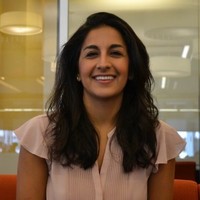Meet Nurse Khiani
While addressing immediate health issues is the duty of medical professionals, educating communities provides an opportunity to prevent these problems from re-occuring. “As much as surgery and medication are important for acute illnesses, the majority of the world lacks public health education,” voiced Tina Khiani, RN.

In 2013 Khiani was involved in public health teaching with the Ugandan Village Project, with a main emphasis on maternal health. Khiani discussed how education on reproduction rights and family planning faced resistance from the community. “People had their cultural norms and superstitions,” she observed.
To address this concern, Khiani’s team employed the help of village health workers and Ugandan MPH students. Having Ugandans invested in the project had a positive impact on the community’s reception. “Seeing all of us present the information helped the community tolerate it a little more, rather than [people] just feeling like foreigners were trying to place their ideas on [them]” Khiani explained. Still, the community remained somewhat hesitant to the majority of the project’s ideas, and this feeling even extended to the health workers themselves.
Khiani gave an example of one village health worker who was strongly against any type of family planning because she had heard a condom had gotten stuck inside a woman and had killed her. Khiani expressed her difficulty in leaving some misconceptions unaddressed. Her desire to not impose foreign ideals on the Ugandans ultimately swayed her decision. “We just had to respect who the community had chosen and who they were going to listen to,” she elaborated.
Placing the community first, the team also attended important events, such as church, local gatherings, funerals and celebrations. Khiani explained how the team’s presence made them more a part of the community “rather than transient volunteers.” She went on to describe how the team utilized a more informal community setting to educate: a soccer game. “When we were trying to do our family planning education, we knew it was a sensitive topic,” Khiani recounted.
She wanted to discuss the topic a little more informally, rather than sit everyone down for a community meeting, give a presentation and then receive feedback and answer questions. The game attracted many observers who participated in focus groups on the sidelines.
Just as important as the spectators were the young men playing soccer. Family planning may seem like a predominantly female issue, but Khiani expressed the necessity of reaching the male population especially in a country like Uganda. She explained how the country’s emphasis on gender norms and patriarchy affect healthcare decision making: “Any decisions go through the men… So [even for] things that may seem very female to us, like pregnancy or maternal health, it was very important from the beginning to involve the men,” she described.
The soccer game’s ability to reach the entire community can be attributed to the social nature of the event. “Not everything has to be so structured and by the book,” Khiani offered. “Education can still happen when people are having fun. It doesn’t have to feel so serious.”
Looking towards the future, Khiani is interested in another project where she can become a part of the community; however, this time is she will be learning, instead of educating. Khiani wants to participate in a Spanish Immersion Program to better improve her language skills. Her desire to learn stemmed from her work with families who only speak Spanish. She related how there are many cases where infants are sick in the NiCU and on medical support, and she wonders whether the family can understand the full picture because there’s not always an interpreter available to help navigate language and cultural barriers.
Education is not just about improving yourself, but utilizing acquired knowledge to assist others. Khiani’s team of both foreigners and locals in Uganda provided the groundwork for the project to continue after she had to leave. “Sustainability is the most important part,” she stated simply, about global health outreach as a whole. What Khiani brings back from her future Spanish immersion program won’t just be developed language skills, but also a stronger foundation to provide care.


